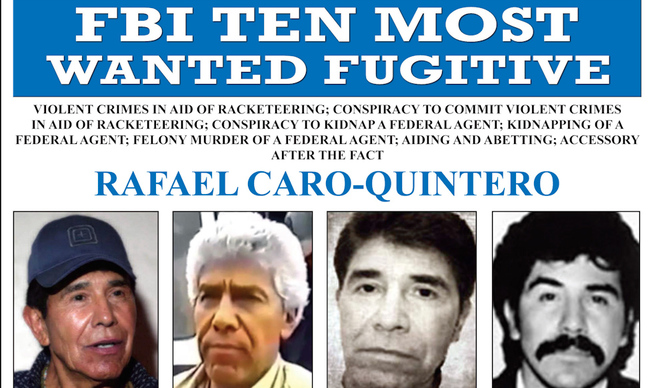The Mexican Secretary of the Navy has managed to arrest one of the most wanted drug traffickers in the country: Rafael Caro Quintero. The history of drug trafficking in Mexico could not be told without the figure of this criminal who, at 69, will once again be behind bars. He was one of the most prominent leaders in the 1980s, founder of the first cartel in the country, owner of hundreds of hectares of marijuana crops on the US border, and responsible for the brutal murder of DEA agent Kiki Camarena. Caro Quintero was sentenced to 40 years in prison for these events, but he was released early thanks to an error in the sentence.
In 2013, a formal defect – which angered the US administration – allowed him to leave prison. Despite the fact that the Justice reversed the ruling days later, it was too late: ‘the capo of capos’ had no intention of returning. Journalist Anabel Hernández managed to interview him during his escape: “I am no longer a danger to society. I don’t want to know anything about drug trafficking. I apologize to the DEA (…) we all deserve a second chance,” she assured at the time. The US intelligence services did not believe him, nor did they stop looking for him during these last nine years. In fact, on May 9, the DEA raised the reward for his capture to $20 million, the highest in the entire agency.
For anti-narcotics agents it was a matter of justice and revenge. On February 9, 1985, his partner, Kiki Camarena, was kidnapped by police officers and handed over to the Guadalajara cartel, who tortured him while a doctor kept him alive. It was later discovered that he had been castrated and buried alive. The story of Camarena, fictionalized in the Netflix series Narcos México, provoked a forceful reaction from the US that, in the end, would lead to the fall of all those responsible for the cartel. Caro Quintero was arrested shortly after in Costa Rica and spent 29 years locked up in a Jalisco prison.
“Do you think I want to go back to jail after being in prison for 29 years?” Caro Quintero asked the journalist in her last interview. The Chihuahua Prosecutor’s Office and the FBI maintain that, since his release from prison, the ‘capo de capos’ has returned to the business taking advantage of the absence of his former partner, Joaquín Guzmán Loera, alias El Chapo, and disputing the space with his children, known as Los Chapitos. In recent years, the veteran drug trafficker would have gained influence in important places like Ciudad Juárez, while hiding, just as other of his associates did before him, in the mountains, among his own.
Two days after President Andrés Manuel López Obrador (AMLO) traveled to Washington to meet with his counterpart Joe Biden, Caro Quintero “was located in the bushes by a canine element” in the municipality of San Simón, in Sinaloa, (not Guachochi as initially thought). This is the first major capture of a drug trafficker from the López Obrador government, whose insecurity strategy, based on militarization and the policy of ‘hugs, not bullets’, was called into question at the end of 2019, when they managed to arrest one Guzmán Loera’s children and were forced to release him to avoid further bloodshed. The Culiacanazo, as that episode is remembered, left 14 victims. AMLO also starred in another controversy by briefly chatting with El Chapo’s mother after finishing a public act.
The US trusts that Mexico complies with the extradition order against Caro Quintero to prevent a ‘formal defect’ or a ‘movie escape’, like the one El Chapo starred in years ago, from setting him free again. In fact, a few minutes after the news broke, a Navy helicopter has collapsed near the city of Los Mochis, as reported by the Sinaloa Red Cross. The first information suggests that there are at least 14 fatalities, but the Mexican government was still unconfirmed at the close of this news if the incident has any relationship with the capture of the ‘capo de capos’. The Secretary of the Navy said: “Based on the information available at the time, a BlackHawk helicopter suffered an accident, the causes of which are unknown at the time.” They also do not know if “it is related to the arrest of the alleged drug trafficker.”
Conforms to The Trust Project criteria
















